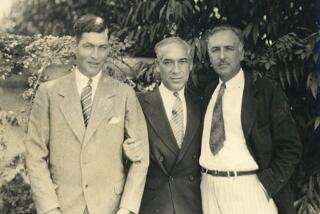Book review: ‘Every Day by the Sun’ by Dean Faulkner Wells
- Share via
Every Day by the Sun
A Memoir of the Faulkners of Mississippi
Dean Faulkner Wells
Crown: 272 pp., $25
The marvelous stories that crowd the pages of “Every Day by the Sun” prove that when you have five generations of Southern relatives as your subject matter, you don’t even need a Nobel laureate to bolster your stock of anecdotes — though it never hurts.
William Faulkner is the star of a few good yarns told here by his niece Dean Faulkner Wells, including one about the time he careened into Memphis, dead drunk and barefoot, and placed a jug of corn liquor on the ground behind a policeman directing traffic, just to make sure it would be well guarded while he went shopping. (“Family members have sworn,” writes Wells, “that the jug was waiting untouched in the street when [he] returned two hours later.”) But his most important function is to serve as the memoir’s ethical and emotional center, the beloved “Pappy” who was far more than an uncle to the author.
She is the daughter of Faulkner’s youngest brother, Dean, who died in a plane crash on Nov. 10, 1935, four months before she was born. “After Dean’s death, William suffered from grief and guilt I imagine almost every day of his life,” Wells writes. “He encouraged Dean to learn to fly, paid for his lessons, gave him a Waco C cabin cruiser — William’s own plane.”
Faulkner assumed legal guardianship of his niece and paid for her education, a year abroad and her wedding. For the first five years of her life, she and her mother, Louise, lived either with “Nannie” (William and Dean’s mother) or with “Mama” and “Papa” (Louise’s parents). “There has never been a Poor Little Fatherless Child as spoiled as I,” writes Wells, displaying a sense of humor that stands her in good stead as she reports the goings-on of her eccentric kin.
“Over the generations, my family can claim nearly every psychological aberration,” she notes. “Narcissism and nymphomania, alcoholism and anorexia, agoraphobia, manic depression, paranoid schizophrenia. There have been thieves, adulterers, sociopaths, killers, racists, liars, and folks suffering from panic attacks and real bad tempers, though to the best of my knowledge we’ve never had a barn burner or a preacher.”
Anyone wondering where William Faulkner got his lurid plots and tormented characters need look no further. Yet his literary career is only occasionally mentioned. Indeed, in his hometown of Oxford, Miss., the nattily dressed, apparently unemployed William was for many years known as “Count No ‘Count,” just another one of those crazy Faulkners with money troubles and bad habits. Not until MGM came to Oxford to film “Intruder in the Dust” in 1948 did the locals see benefit in those scandalous books he wrote, though the novel’s quiet advocacy of racial justice was not popular in Mississippi.
That includes his relatives. Her uncle and mother, the author comments, “formed a moderate minority in our family of ardent segregationists and racists.” When as a schoolgirl Wells recited the famous declaration that “all men are created equal” to Nannie, she tells us, she was firmly corrected: “Yes they are, my lamb, with the exception of nigrahs, foreigners, Catholics, and Jews.” The author displays the same matter-of-fact attitude toward the bigotry of people she loved as she does toward their other faults; human frailty is no surprise to her.
A good story takes precedence over moral judgments. (And fact-checking: Wells misidentifies the quote from the Declaration of Independence about all men being created equal as being from the Bill of Rights.) In a small Southern town where everyone knew everyone else and their kin had all known one another for generations, the author learned to see people as they are and not to bother making excuses for them. Oxford and her extended family gave Wells the only security she knew as a child after her mother married a journalist who kept drinking himself out of jobs. Nutty though many of her clan might be, they connected her to a simpler, safer world, where people cut down their own Christmas tree from the woods out back and where a World War II newsreel at the local theater was interrupted by Nannie calling, “That’s my Jackie! Bob, run it back!” And then, Wells tells us, “My cousin-in-law Bob…dutifully rewound the film by hand” so Nannie could watch her son Jack invade Sicily all over again.
That world is gone; Wells acidly notes the “cookie-cutter subdivisions” and “McMansions” that have sprung up in Oxford as everywhere else. Happily for us, her affectionate, unblinking memoir gives us a vivid snapshot of what once was: in vivid detail, none of it airbrushed.
Smith is a contributing editor for the American Scholar and reviews books for The Times, the Washington Post and the Chicago Tribune.
More to Read
Sign up for our Book Club newsletter
Get the latest news, events and more from the Los Angeles Times Book Club, and help us get L.A. reading and talking.
You may occasionally receive promotional content from the Los Angeles Times.







